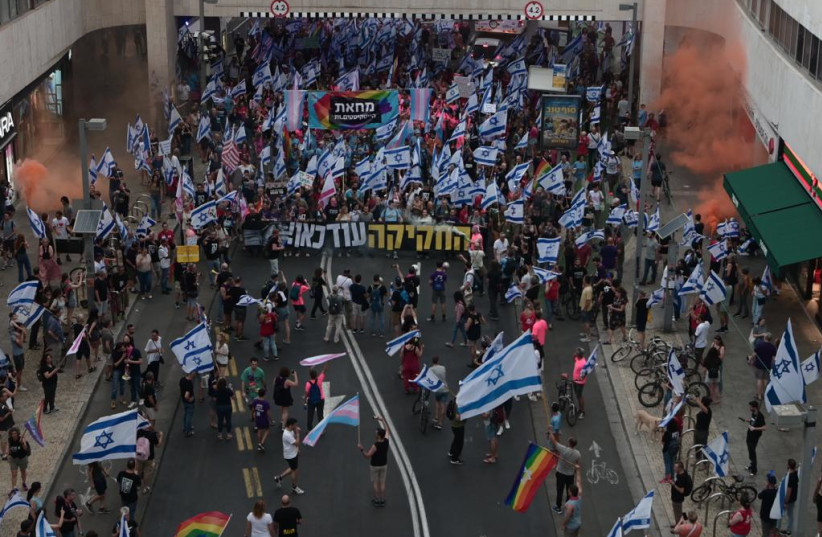On Monday night, Col. Eliav Elbaz, the commander of the Binyamin Regional Brigade, was shouted at and called names like “murderer” and “traitor” when he went to pay a shiva call in Yad Binyamin at the home of Harel Masoud. Masoud was one of four people murdered by terrorists outside Eli last week.
On Tuesday morning, tires were set on fire, and streets closed in the residential neighborhood outside the home of Justice Minister Yariv Levin in Modi’in.
The British have a saying: “Certain things are just not done.” This phrase captures the concept that there are unwritten rules and norms that deem certain actions as inappropriate and unacceptable because they go against the established standards of behavior.
In the past, in this country, it would have been considered unacceptable to drive away from a shiva house a senior army officer who makes immense sacrifices every day for the nation’s security. Similarly, loudly protesting in front of a minister’s residential home at 6:30 a.m., burning tires on his street, and blocking the road with barbed wire would have been viewed as actions that exceeded acceptable behavior.
No more. Now anything goes when it comes to making a point or protesting against government or IDF policies that one disagrees with.

The extremes of protests
Vigilantes can burn and rampage; senior IDF officers can be berated; protest organizers can threaten to block the airport because they deem that legislating a change in the “reasonableness” clause is a step that will put Israel on the path toward dictatorship; and former Meretz MK and deputy chief of staff Yair Golan can call on people to break the law as part of civil disobedience.
Back in 1995, the state leveled sedition charges against Moshe Feiglin, Shmuel Sackett and Benny Elon for making similar calls to civil disobedience during protests against the Oslo Accords.
Why were they charged with sedition? Because, back then, certain things were just not done.
Today, these things are done with impunity.
Shikma Bressler, one of the protest movement leaders, threatened continuous disruptive acts at a press conference Tuesday, confidently stating that the protests will “make it clear to [Prime Minister Benjamin] Netanyahu and the group of extremists who took over the country that the protest movement will not let them destroy Israel.”
Bressler is blessed with complete certitude. She knows that her diagnosis that Netanyahu is a dictator-in-waiting is correct and that the cause she represents is right. As such, all means – short of violence – are permitted to forestall what she has determined will be catastrophic for Israel.
Those extremists who screamed insults at Elbaz outside a shiva house are convinced of their own righteousness, which they believe allows them to cross all boundaries of what was once acceptable behavior in this country.
As a result of all this perfect certitude, the country teeters on the brink of chaos. But Bressler, Golan, and those who drove Elbaz away from the Masoud shiva house will say, as the 1980s Billy Joel song goes, “We didn’t start the fire.”
And they didn’t.
The harassment of current government ministers, which escalated in front of Levin’s home, did not originate with the anti-judicial reform movement protests.
In the previous government, the right wing made life unbearable for former prime minister Naftali Bennett and ministers from his Yamina Party. This included threats to their spouses and children, disruptions in public places, and even following them in their cars, attempting to coerce them to defect and bring down the government.
Nor did the extremists who berated Elbaz invent the idea of berating a senior IDF officer.
When Samaria Brigade Commander Col. Roi Zwig was ordered to enter Nablus last year to repair damage at Joseph’s Tomb, he inspired his soldiers with religiously-tinged words emphasizing the Jewish people’s connection to this land.
He was hammered by the Left, with Peace Now calling for his removal and former Meretz MK Zehava Galon accusing him of using “the rhetoric of Hezbollah.”
What those engaging in acts that simply should not be done today against their political and ideological opponents fail to realize is the same thing that those who acted similarly in the past toward their political and ideological opponents failed to grasp: the methods they employ today will be adopted by their adversaries tomorrow.
If activists opposing judicial reform believe they can violate the law and block airports today to protest against a right-wing government, then activists advocating for Greater Israel can also disregard the law and block airports tomorrow if a Center-Left government returns to power and proposes territorial concessions to the Palestinians.
If reserve pilots today declare that they will refuse missions if the judicial reform plan is approved, then tomorrow, Golani reservists would be justified in refusing missions across borders to implement non-security related policies of a Center-Left government they disagree with.
If one side does things that “simply are not done” today, the other side will do it tomorrow. We are already witnessing this phenomenon.
The question is not “who started the fire,” but rather who will have the courage to put it out.•
